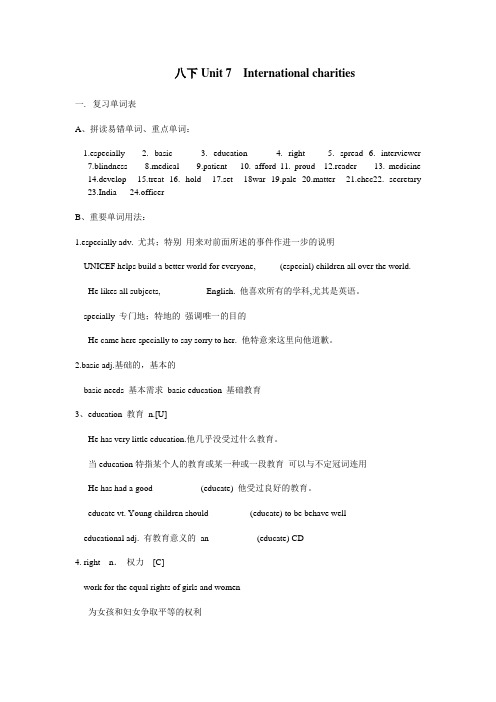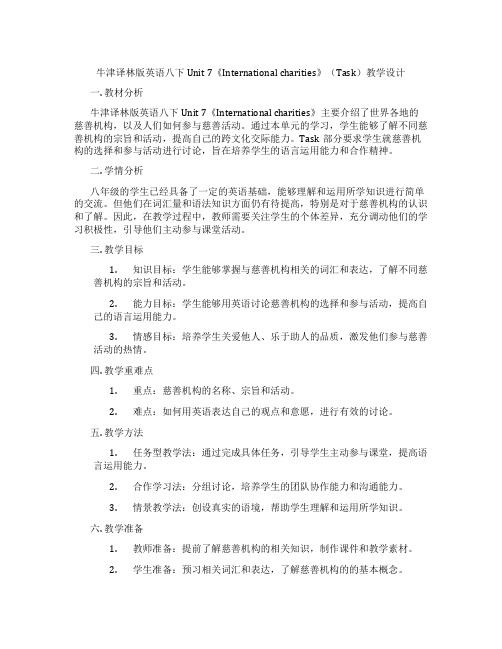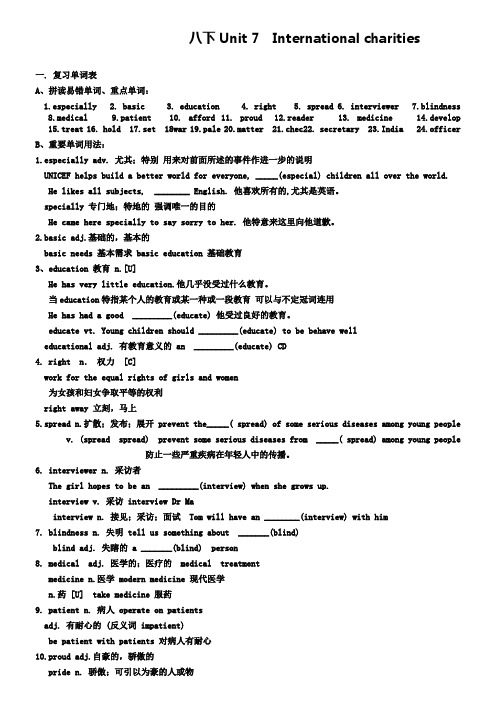【牛津译林版】中考英语一轮复习教案:8下 Unit 7 International charities
- 格式:doc
- 大小:93.50 KB
- 文档页数:10

The rain preve nted him from coming.大雨使他不能来。
3. operate做手术,操作,开动a表示做手术;’不及物动词。
表示给某人做手术时,加介词on,女口:The doctor operated on him just now.刚才医生给他做了手术。
b.表示操作或开动(机器)'如:你会操作这台电脑吗?4. proud形容词,骄傲的,自豪的”表示对.... .感到骄傲",常用be proud of.女口:We ‘ re proud of our motherland.我们对我们的祖国感到自豪。
另外,pride名词,骄傲”常用于take pride in sb/sth对“….感到骄傲.,如:She takes pride in her success.Step5 HomeworkORBIS, a charityuses its to v sit poor areastreats people withTeach ing n otes8B Un it 7 Intern ati onal charitiesdoes on the pla^e/n vites local on boardhelps people:eaches themStep 1 Prese ntati on1. Give stude nts a picture, prese nt new words and phrases.2. Give stude nts some passive sentences in the un it, tran slate them into Chin ese.Step 2 Grammar1. 被动语态和主动语态的基本概念当主语是谓语的执行者时,用主动语态。
当主语是谓语的承受者时,用被动语态。
如:We clean the classroom every day.Theclassroom is clea ned (by us) every day.2. 被动语态的基本构成3.被动语态的基本用法1)动作的执行者是泛指或者不言自明时。

八下Unit 7 International charities一. 复习单词表A、拼读易错单词、重点单词:1.especially2. basic3. education4. right5. spread6. interviewer7.blindness 8.medical 9.patient 10. afford 11. proud 12.reader 13. medicine14.develop 15.treat 16. hold 17.set 18war 19.pale 20.matter 21.chec22. secretary23.India 24.officerB、重要单词用法:1.especially adv. 尤其;特别用来对前面所述的事件作进一步的说明UNICEF helps build a better world for everyone, _____(especial) children all over the world.He likes all subjects, ________ English. 他喜欢所有的学科,尤其是英语。
specially 专门地;特地的强调唯一的目的He came here specially to say sorry to her. 他特意来这里向他道歉。
2.basic adj.基础的,基本的basic needs 基本需求basic education 基础教育3、education 教育n.[U]He has very little education.他几乎没受过什么教育。
当education特指某个人的教育或某一种或一段教育可以与不定冠词连用He has had a good _________(educate) 他受过良好的教育。
educate vt. Young children should _________(educate) to be behave welleducational adj. 有教育意义的an _________(educate) CD4. right n.权力[C]work for the equal rights of girls and women为女孩和妇女争取平等的权利right away 立刻,马上5.spread n.扩散;发布;展开prevent the_____( spread) of some serious diseases among youngpeoplev. (spread spread) prevent some serious diseases from _____( spread) among young people防止一些严重疾病在年轻人中的传播。

牛津译林版英语八下Unit 7《International charities》(Task)教学设计一. 教材分析牛津译林版英语八下Unit 7《International charities》主要介绍了世界各地的慈善机构,以及人们如何参与慈善活动。
通过本单元的学习,学生能够了解不同慈善机构的宗旨和活动,提高自己的跨文化交际能力。
Task部分要求学生就慈善机构的选择和参与活动进行讨论,旨在培养学生的语言运用能力和合作精神。
二. 学情分析八年级的学生已经具备了一定的英语基础,能够理解和运用所学知识进行简单的交流。
但他们在词汇量和语法知识方面仍有待提高,特别是对于慈善机构的认识和了解。
因此,在教学过程中,教师需要关注学生的个体差异,充分调动他们的学习积极性,引导他们主动参与课堂活动。
三. 教学目标1.知识目标:学生能够掌握与慈善机构相关的词汇和表达,了解不同慈善机构的宗旨和活动。
2.能力目标:学生能够用英语讨论慈善机构的选择和参与活动,提高自己的语言运用能力。
3.情感目标:培养学生关爱他人、乐于助人的品质,激发他们参与慈善活动的热情。
四. 教学重难点1.重点:慈善机构的名称、宗旨和活动。
2.难点:如何用英语表达自己的观点和意愿,进行有效的讨论。
五. 教学方法1.任务型教学法:通过完成具体任务,引导学生主动参与课堂,提高语言运用能力。
2.合作学习法:分组讨论,培养学生的团队协作能力和沟通能力。
3.情景教学法:创设真实的语境,帮助学生理解和运用所学知识。
六. 教学准备1.教师准备:提前了解慈善机构的相关知识,制作课件和教学素材。
2.学生准备:预习相关词汇和表达,了解慈善机构的的基本概念。
七. 教学过程1.导入(5分钟)教师通过向学生介绍自己参与的慈善活动,引发学生对慈善机构的兴趣,导入新课。
2.呈现(10分钟)教师展示慈善机构的图片和相关信息,引导学生关注慈善机构的名称、宗旨和活动。
3.操练(15分钟)学生分组讨论,每组选择一个慈善机构,用英语介绍其宗旨和活动。


苏教牛津译林初中英语重点知识精选掌握英语语法知识,巩固词汇量和各种语态,学好英语基础一定要扎实,大家一起练习吧!牛津译林初中英语和你一起共同进步学业有成!英语(八年级下册)Unit 7 International charitiesReading ( I )冷雪I. T eaching a ims and learning objectivesBy the end of the lesson, students should be able to:1. get a general idea of ORBIS.2. introduce ORBIS and how it works to others.3. know what they can do to help ORBIS.II. Teaching contents1. New words and phrases: interviewer, blindness, medical, patient, afford, proud, reader,medicine, develop, treat, go to hospital, on board, carry on2. New structures: The plane is also used as a training centre.Many of our patients can’t afford to go to hospital.I’m proud to help people see again and improve their skills.III. Focus of the lesson and predicted area of difficultyTo retell the interview to others.IV. Teaching proceduresStep 1 Pre-reading1. Look and sayT: Look at these logos of charities. Do you know the name of each logo?2. Ask and answerT: This is the logo of ORBIS. What does the logo look like? Why is there a plane in the logo?Why is it a special plane?Step 2 While-reading1. Skimming(1) Read and answer.T: Look at the picture. Who is he? (Dr Ma). He is an ORBIS doctor. Look at this man. He is interviewing Dr Ma. He is an interviewer. Please read the interview quickly and find how many questions the interviewer asks.(2) Read and divide.T: Read the interview quickly and divide it into 4 parts. Tell me the main idea of each part. 2. Scanning(1) Read the first part (Lines 1-6)T: What does the word “blindness” mean?How many people are blind or have other eye problems?Can they be prevented or cured?Where are most of them from?(2) Read the second part (Lines 7-15)Introduce “Flying Eye Hospital” by asking “what does ORBIS use to visit poor areas?”Let the students read and find the answer to the question why the plane is used as an operation room and a training centre.Ask the students to retell the work of ORBIS.Answer the questions: Why is there a plane in the logo? Why is it a special plane?(3)Read the third part (Lines 16-20)Read the interview er’s question and Dr Ma’s answer to know the number 150.Read this part and fill the blanks with adjectives.Dr Ma is very _______.Dr Ma’s work is very ________.Dr Ma feels very __________ of his work.(4) Read the fourth part (Lines 21—26)Why can most eye problems and diseases be treated and cured?What is needed to carry on with ORBIS?What does Dr Ma hope?3. Read the interview loudlyLet the students read the interview together and then in roles. Pay attention to the pronunciation and intonation.Step 3 Post-reading1. Fill in the blanks2. Have an interviewT: Work in pairs and talk about how ORBIS works. Suppose one is an interviewer, and the other is an ORBIS doctor, a local doctor or a patient.3. Have a discussionT: Work in groups of four and talk about what we can do to support ORBIS. The following suggestions may help you.(1) Introduce ORBIS to mo re people.(2) Tell people that it is important to take good care of eyes.(3) Donate more money to ORBIS.4. SummaryGive a helping hand. Many hands ma ke light work.V. Homework1. Read the interview three times after the tape.2. Try to retell the interview.3. Finish B2 on Page 96.相信自己,就能走向成功的第一步教师不光要传授知识,还要告诉学生学会生活。

八下Unit 7 International charities一. 复习单词表A、拼读易错单词、重点单词:1.especially2. basic3. education4. right5. spread6. interviewer7.blindness8.medical 9.patient 10. afford 11. proud 12.reader 13. medicine 14.develop15.treat 16. hold 17.set 18war 19.pale 20.matter 21.chec22. secretary 23.India 24.officerB、重要单词用法:1.especially adv. 尤其;特别用来对前面所述的事件作进一步的说明UNICEF helps build a better world for everyone, _____(especial) children all over the world.He likes all subjects, ________ English. 他喜欢所有的,尤其是英语。
specially 专门地;特地的强调唯一的目的He came here specially to say sorry to her. 他特意来这里向他道歉。
2.basic adj.基础的,基本的basic needs 基本需求 basic education 基础教育3、education 教育 n.[U]He has very little education.他几乎没受过什么教育。
当education特指某个人的教育或某一种或一段教育可以与不定冠词连用He has had a good _________(educate) 他受过良好的教育。
educate vt. Young children should _________(educate) to be behave welleducational adj. 有教育意义的 an _________(educate) CD4. right n.权力 [C]work for the equal rights of girls and women为女孩和妇女争取平等的权利right away 立刻,马上5.spread n.扩散;发布;展开 prevent the_____( spread) of some serious diseases among young peoplev. (spread spread) prevent some serious diseases from _____( spread) among young people防止一些严重疾病在年轻人中的传播。
牛津译林版八年级下册英语教案Unit7InternationalcharitiesTask英语(八年级下册)Unit 7 International charitiesTask冷雪I. Teaching aims and learning objectivesBy the end of the lesson, students should be able to:1. learn about an ORBIS volunteer called Diana;2. write a report about an Indian girl helped by UNICEF;3. learn the five steps of writing (prewrite—write—revise—edit—publish).II. Teaching contents1. New words and phrases: secretary, India, officer, make up one's mind +Z+X+X+K]科来源学+[2. New structures: She wanted to help poor people with eye problems see again, so she made upher mind to train as a nurse and attended courses after work.She is getting used to travelling by plane.III. Focus of the lesson and predicted area of difficulty1. To write a report about an Indian girl helped by UNICEF.2. To learn the five steps of writing (prewrite—write—revise—edit—publish).|]科来源[:学IV. Teaching proceduresStep 1 Lead-inDescribe the pictures in your own wordsT: Amy wants to write about the work of an ORBIS nurse called Diana for her class presentation. And she found some pictures of Diana.T: Look at these two pictures. Can you guess Diana's job in the past? As you see, she was anoffice lady, a secretary of a pany. Did she look happy? Look at the second one. What does shedo now? Does she look happy? Why does she change the job and what happened? Try todescribe the pictures in your own words.,]科来源[学Step 2 Reading prehension1. Discuss the picturesStudents read the six pictures carefully. They can ask any question about the story, and invitethe other students to answer. They can get the answer from the report or use their imagination toget reasonable answers.The teacher gives six questions. Students read and underline the answers in the report.(1) What was her life like?(2) Which does she like better, travelling by car or by plane?(3) In which way did she learn about ORBIS?(4) After learning about it, how did she feel and what did she do?(5) What is her life like now?(6) How does she feel about the changes?2. Analyze the structure of the articleT: Now please find the topic sentences of each paragraph, and get the main idea of each paragraph. [来源:]3. pare the lives in the past and at presentT: The first paragraph and the third paragraph tell Diana's work, lifestyle and way of travelling. They have similar structures.Step 3 Writing practice1. How to writeShow the five steps of writing; indicate that we should write step-by-step.2. Prewriting—choose a topic/collect details(1) Ask students to write about an Indian girl helped by UNICEF and show the pictures and the information. Show the subject, form, purpose and audience.(2) Ask students to plete a 5 W's chart.Writing tips: An experience includes the basic details, sensory details and dialogues.(3) Ask students to put things in order.Ask students to use the time line to organize things in time order.3. Writing—write a first draft: a beginning + a middle + an ending :ZXXK]来源[Show the structure of the report.(1) The beginning should get the readers' attention and introduce the experience. Show threeways to begin:a. Start with dialogues;b. Begin with a fact or an interesting statement;c. Put yourself in the middle of the action.Give three examples and encourage students to write their own.(2) The middle part tells story in time order. It may include sensory details, use dialogues, and share the feelings people experienced.Give a model middle and guide the students to pay attention to the transition words andsensory details.(3) The ending should bring the story to a close. Show three possible ways:a. Tell what you learnt from the experience;b. Explain how the experience changed you;c. Tell how you felt about the experience.Give three examples and encourage students to write their own.4. Revising—improve your writing(1) Show the steps to revise.Read—review—ask—change(2) Add and move parts.Use the model passage to show how to add and move parts and explains why.5. Editing—check for errorsInvite the students to check the article for punctuation, capitalization, grammar error and spelling.6. Publishing—share your writingShow the final copy.Give two tips:a. Use blue or black ink and write neatly;b. Indent every paragraph and leave a one-inch margin of all sides.7. Assessing the final copyShow how to assess the final copy.8. Reflecting on your writingReflect by answering four questions.9. The advantages of writingShow the advantages of writing:bee a better student, understand your experience, connect with others, enjoy life ... Encourage the students to write more.10. Write your articleV. Homework1. Make your article better.2. Put the best articles onto the wall and enjoy together. 附件1:律师事务所反盗版维权声明附件2:独家资源交换签约学校名录(放大查看)学校名录参见:://.。
牛津译林版英语八年级下册《Unit 7 International Charities Welcome to the unit》教学设计1一. 教材分析《Unit 7 International Charities Welcome to the unit》是牛津译林版英语八年级下册的一单元,主要介绍国际慈善机构,通过本单元的学习,学生可以了解不同慈善机构的宗旨和活动,提高他们的英语阅读和听说能力。
本单元包括阅读理解、词汇学习、语法讲解、听力训练和口语表达等多种类型的学习内容,旨在培养学生的综合语言运用能力。
二. 学情分析学生在学习本单元前,已经掌握了基本的英语语法和词汇,具备一定的阅读和听说能力。
但部分学生对慈善机构的了解较少,可能对课文内容产生陌生感。
因此,在教学过程中,教师需要帮助学生建立起对慈善机构的认识,并通过生动有趣的教学活动,激发学生的学习兴趣。
三. 教学目标1.知识目标:学生能掌握本单元的词汇和语法知识,理解课文内容,了解不同慈善机构的宗旨和活动。
2.能力目标:学生能提高阅读和听力能力,能用英语简单介绍慈善机构,并进行口语交流。
3.情感目标:学生能培养关爱他人、乐于助人的品质,树立正确的价值观。
四. 教学重难点1.重点:本单元的词汇和语法知识,以及课文内容的理解。
2.难点:如何引导学生运用所学知识进行口语交流,提高他们的实际运用能力。
五. 教学方法1.任务型教学法:通过完成各种任务,让学生在实践中学习英语,提高他们的综合语言运用能力。
2.情境教学法:创设生动有趣的情境,让学生在真实的环境中学习英语,提高他们的学习兴趣。
3.小组合作学习:鼓励学生互相合作,共同完成学习任务,培养他们的团队意识和沟通能力。
六. 教学准备1.教学课件:制作课件,内容包括课文讲解、词汇学习、语法讲解等。
2.教学素材:收集关于慈善机构的图片、视频等素材,用于教学展示。
3.听力材料:准备相关的听力材料,用于训练学生的听力能力。
牛津译林版八年级下册英语Unit 7教学设计一. 教材分析Unit 7为牛津译林版八年级下册英语教材中的一个单元,主要围绕日常生活话题展开。
通过本单元的学习,学生将掌握一般现在时态的疑问句和否定句的构成及其运用,同时学习到与日常生活相关的一些词汇和表达方式。
本单元包括三个部分:课文阅读、语法讲解和综合练习。
二. 学情分析八年级的学生已经具备了一定的英语基础,能够听、说、读、写一些简单的日常用语。
但部分学生对英语学习的兴趣不足,学习积极性有待提高。
此外,学生的英语水平参差不齐,因此在教学过程中需要关注不同层次学生的需求,激发他们的学习兴趣,提高他们的英语实际运用能力。
三. 教学目标1.知识目标:学生能够掌握一般现在时态的疑问句和否定句的构成及其运用;学会与日常生活相关的词汇和表达方式。
2.能力目标:学生能够熟练运用一般现在时态进行日常交流,提高英语听说读写能力。
3.情感目标:培养学生对英语学习的兴趣,增强自信心,提高团队合作意识。
四. 教学重难点1.教学重点:一般现在时态的疑问句和否定句的构成及其运用;与日常生活相关的词汇和表达方式的掌握。
2.教学难点:一般现在时态的疑问句和否定句在实际语境中的运用;词汇和表达方式的灵活运用。
五. 教学方法1.任务型教学法:通过设定各种真实的任务,让学生在完成任务的过程中学习和运用英语。
2.情境教学法:创设日常生活情境,激发学生的学习兴趣,提高他们的实际运用能力。
3.合作学习法:引导学生分组讨论、互动交流,培养团队合作意识,提高口语表达能力。
六. 教学准备1.教学PPT:制作包含课文内容、语法讲解、练习题等的PPT。
2.课文录音:下载或录制课文阅读的音频文件。
3.教学卡片:制作包含关键词语和表达方式的卡片。
4.教学视频:准备与日常生活相关的英语视频素材。
七. 教学过程1.导入(5分钟)利用英语歌曲或视频素材,引起学生对日常生活话题的兴趣,激发学习动机。
教师简要介绍本节课的学习内容,引导学生进入学习状态。
八下Unit 7 International charities一. 复习单词表A、拼读易错单词、重点单词:1.especially2. basic3. education4. right5. spread6. interviewer7.blindness 8.medical 9.patient 10. afford 11. proud 12.reader 13. medicine14.develop 15.treat 16. hold 17.set 18war 19.pale 20.matter 21.chec22. secretary23.India 24.officerB、重要单词用法:1.especially adv. 尤其;特别用来对前面所述的事件作进一步的说明UNICEF helps build a better world for everyone, _____(especial) children all over the world.He likes all subjects, ________ English. 他喜欢所有的学科,尤其是英语。
specially 专门地;特地的强调唯一的目的He came here specially to say sorry to her. 他特意来这里向他道歉。
2.basic adj.基础的,基本的basic needs 基本需求basic education 基础教育3、education 教育n.[U]He has very little education.他几乎没受过什么教育。
当education特指某个人的教育或某一种或一段教育可以与不定冠词连用He has had a good _________(educate) 他受过良好的教育。
educate vt. Young children should _________(educate) to be behave welleducational adj. 有教育意义的an _________(educate) CD4. right n.权力[C]work for the equal rights of girls and women为女孩和妇女争取平等的权利right away 立刻,马上5.spread n.扩散;发布;展开prevent the_____( spread) of some serious diseases among youngpeoplev. (spread spread) prevent some serious diseases from _____( spread) among young people防止一些严重疾病在年轻人中的传播。
6. interviewer n. 采访者The girl hopes to be an _________(interview) when she grows up.interview v. 采访interview Dr Mainterview n. 接见;采访;面试Tom will have an ________(interview) with him7. blindness n. 失明tell us something about _______(blind)blind adj. 失瞎的a _______(blind) person8. medical adj. 医学的;医疗的medical treatmentmedicine n.医学modern medicine 现代医学n.药[U] take medicine 服药9. patient n. 病人operate on patientsadj. 有耐心的(反义词impatient)be patient with patients 对病人有耐心10.proud adj.自豪的,骄傲的pride n. 骄傲;可引以为豪的人或物I’m _______(proud) to help people see again.The top student is _______(proud) of his schoolwork.He’s the _______(proud) of the whole world. 他是全世界的骄傲。
11.develop v. 发展;加强development n. 发展developed adj. 发达的developing adj. 发展中的Modern medicine ________(develop) quickly.spend all his life on the ________(develop) of better rice plantsa ________(develop) country 一个发达国家.中国是一个发展中国家China is a ________(develop) country12. treat vt.治疗;处理(强调过程)treatment n. He needs a medical ________(treat).He got very ill, but he _________(treat) very well.cure 强调结果;指治愈某种疾病或某人的疾病treat v. 对待treat the boy as his own son 把这个男孩作为他自己的儿子对待treat n. 招待give us a treat of some candytrick or treat 不招待,就使坏13.hold vt. 举行(hold---held-- held )We ________(hold) a football match next week.= A football match will take place next week. Last week, a charity show ________(hold) by the Students’ Union.14. matter n.事情,问题What’s the matter?= What’s wrong ?matter v. 要紧,有重大影响Size and body type ________(not matter).高矮胖瘦不重要。
I’m sorry I have broken your bike. ------- It doesn’t matter.15.check n.检查let me have a checkcheck v. 检查;核实____ the scene ___ fingerprints16.India n. 印度India is a great country to visit.Indian adj. 印度(人)的Indian filmsIndian n. 印度人an Indian________(India) speak Hindi in ________(India).17.officer n. 官员an officeroffice n.办公室office worker 办公室职员,上班族二、重点词组、句型用法:1.You have some pocket money left. 你还有些零花钱剩下.have … left 有……留下,剩下1) 晚会结束的时候,我们还剩下些食物。
At the end of the party, we had some food left.2) 我饿了。
你剩下什么吃的没有?I am hungry. Do you have anything to eat left?We _____ ______ 5 kilometers _____.(我们只剩5公里了)2. I’m too weak to walk any further. 我很虚弱,走不动了。
further是far的比较级,表示距离上更远,any 能够修饰比较级但多用于否定句或疑问句Can you stand any further away?too … to … 太……而不能……The girl is too young to go to school3. UNICEF provides basic education for children in poor areas.provide sb with sth / provide sth for sb 向某人提供某物。
例如:Our parents are willing to provide money and food for us students so that we can study better.=Our parents are willing to provide us students with money and food so that we can study better.4 . About 285 million people around the world are blind or have other eye problems, mostly in poor areas, and about 80 per cent of these cases 80 per cent of these cases can be prevented or cured.most = very 很;非常(不要加定冠词)almost = very nearly 指在程度上相差很少mostly = mainly 大部分;主要地;It’s _____dangerous to play with fire. 玩火是很危险的______ no one believed what he said. 几乎没人相信他的话。
The students in our class are ______ from the factory. 我们班的学生主要来自这家工厂。
2)can be prevented or cured 是情态动词的被动结构,注意prevent的用法:3) prevent sb. from doing sth.阻止某人做某事.(stop… from doing sth)keep…from doing sth)We should prevented water from_________ (provent).prevent 的名词prevention预防总比治愈强. __________ is better than cure.Forests help to keep the water from running away.森林有助于防止水的流失5. 80 per cent of these cases 80 per cent of … 80%的…a. 我们学校里百分之90%的教师是女教师。